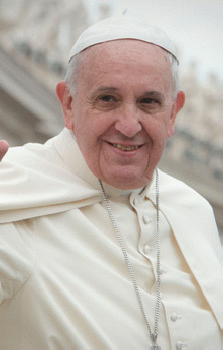
Papa Francisco en Canonizazion de Juan XXIII y Juan Pablo II.PNG
(Image by Wikipedia (commons.wikimedia.org), Author: Of original: Jeffrey Bruno from New York City, United States;
Of crop: uploader) Details Source DMCA
Duluth, Minnesota (OpEdNews) December 9, 2020: Recently I read the Irish American author Thomas Cahill's perceptive 1998 book The Gifts of the Jews: How a Tribe of Desert Nomads Changed the Way Everyone Thinks and Feels.
See my OEN article "Thomas Cahill on The Gifts of the Jews" (dated November 21, 2020):
Subsequently, I read his 1995 book How the Irish Saved Civilization: The Untold Story of Ireland's Heroic Role from the Fall of Rome to the Rise of Medieval Europe - that is, roughly in the period commonly referred to as the Dark Ages, after the fall of the Roman Empire in the West circa 476.
Of course, the fall of the Roman Empire in the West did not mean that the lands or the people in them disappeared. They did not disappear. But something was lost in terms of commerce and communication across those lands and among those people to warrant referring to those centuries as the Dark Ages in European history.
Now, in both Cahill's 1995 and 1998 books, he is attentive to writing systems and to oral tradition. For example, in his 1998 book The Gifts of the Jews, he discusses the Sumerian cuneiform writing system and the Epic of Gilgamesh in connection with Mircea Eliade's account of cyclical approaches to mythic time, as distinct from historical time. (See the index for Eliade and for cyclical worldview for specific page references.)
For another discussion of the cyclical worldview, see that American Indian scholar Donald L. Fixico's book The American Indian Mind in a Linear World: American Indian Studies and Traditional Knowledge (Routledge, 2003).
But in Cahill's 1995 book How the Irish Saved Civilization, he does not even mention Eliade's work and the cyclical worldview in his discussion of the Irish epic Tain Bo Cuailnge, which he describes as the Irish foundation myth (see the index for Tain for specific page references).
Cahill says, "One problem with this Irish pre-historic material is that we cannot date it with any precision. From the Celtic invasion in the fourth century B.C. to the invasion of books nine centuries later, after which the traditional oral lore began to be written down, we are looking at a timeless Ireland" - "a land outside of time" (page 81).
Cahill also says, "Such [primary oral] cultures have been known to exist for many hundreds of years without undergoing appreciable alteration. What normally changes them is outside influence, rather than inner dynamics; and Ireland, splendidly isolated in the Atlantic and largely beyond the traffic of civilization, suffered few intrusive influences. . . . On this timeless island, one would have come in contact with a culture very like that of the British and continental Celts prior to the centuries of Roman influence. In this place and period, one might also have experienced a milieu something like such pre-Roman cultures as Homeric Greece [and the Iliad and the Odyssey], the India of the Mahabharata, and Sumer [and the Epic of Gilgamesh], with their common equipage of warhorses and warrior chariots and their common standards of heroic action" (page 82; his italics).
Cahill claims that "the rich trove of early Irish literature [is] the earliest vernacular literature of Europe to survive - because it was taken seriously enough to be written down [by Irish scribes]" (page 160).
Now, I appreciate Cahill's deeply informed candor about Ireland's cultural history. It is remarkable that Ireland produced monks and monasteries with scriptoriums and libraries that preserved earlier Greek and Roman written texts, just as scattered communities of Jews preserved the written texts of the Hebrew Bible, as Cahill notes in passing (page 193).
When I credit Cahill with being deeply informed about cultural history, I mean that he is familiar with the work of the American Jesuit renaissance specialist and cultural historian Walter J. Ong (1912-2003; Ph.D. in English, Harvard University, 1955), most notably with Ong's book The Presence of the Word: Some Prolegomena for Cultural and Religious History (Yale University Press, 1967), the expanded version of his 1964 Terry Lectures at Yale University, and with Ong's book Orality and Literacy: The Technologizing of the Word (Methuen, 1982), his most widely translated book.
See my OEN article "Walter J. Ong's Philosophical Thought" (dated September 20, 2020):
(Note: You can view every article as one long page if you sign up as an Advocate Member, or higher).




